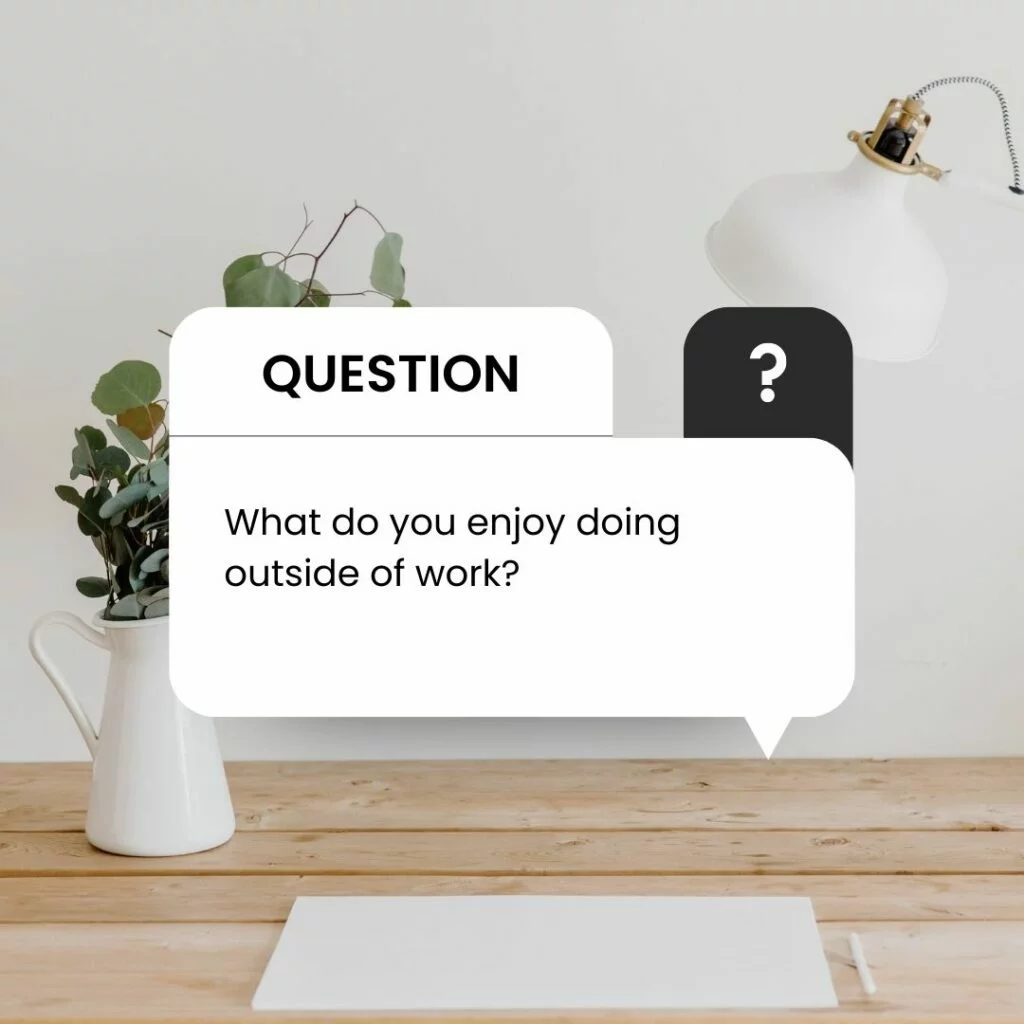How to answer: What do you enjoy doing outside of work?

When it comes to job interviews, it’s not uncommon for employers to ask about your interests and hobbies outside of work. While this question may seem unrelated to the job at hand, it actually serves a purpose in helping employers gauge your personality, work-life balance, and potential cultural fit within the company. By asking about your extracurricular activities, employers are looking to gain insight into your passions, values, and how you spend your time outside of the office.
Your answer to this question can provide employers with valuable information about your character and what motivates you. It allows them to see if you have a well-rounded lifestyle and if your interests align with the company’s values. Additionally, sharing your hobbies can also demonstrate your ability to manage your time effectively and maintain a healthy work-life balance. So, while it may seem like a casual question, it’s important to approach it thoughtfully and strategically to make a positive impression on potential employers.

How to Answer a Question: What do you enjoy doing outside of work?
There are actually several ways to approach this question, but let me break it down for you. First, let’s talk about why interviewers ask it and what a typical answer might be. Then, I’ll share with you what the ideal response should be, as well as what makes a good or even a great answer.
And of course, I’ll throw in an extra tip to help you absolutely nail this question. Sound good? Let’s dive in!
Why did the interviewer ask this?
To get a glimpse of your personality outside the professional setting and see what passions or interests you have.
Typical Answer
I like reading and traveling.
Wrong Answer
Perfecting the art of doing absolutely nothing on Sundays.
Good Answer
Mention hobbies or activities that genuinely interest you.
Great Answer
Discuss a hobby in depth, possibly connecting it to how it benefits your professional life.
Last Tip on How to Answer What do you enjoy doing outside of work?
Be genuine and choose hobbies that reflect a balance in life.
If you’re into this tip, you can download 121 Interview Questions and Answers for free! It’s a great way to get more insights on how to answer those common questions in the best way possible.
Practice Your Answers in a Mock Job Interview
Answering this question is a breeze if you know how! But what really counts is practice. The best way to do that? Give mock interviews a shot! You can learn more about mock interviews here, or try out this Free Mini-Interview.
Final Thoughts on the Question: What do you enjoy doing outside of work?
In conclusion, by following these tips on how to answer the question, “What do you enjoy doing outside of work?”, you will be able to confidently and authentically respond. Remember to showcase your passions and hobbies, highlighting how they contribute to your personal growth and well-being. Emphasize the skills and qualities you have developed through these activities, demonstrating your ability to balance work and life effectively. By doing so, you will not only impress the interviewer but also inspire them with your enthusiasm and dedication towards leading a fulfilling life outside of work.
Ultimately, the question about what you enjoy doing outside of work is an opportunity to showcase your unique personality and interests. It allows you to paint a vivid picture of who you are beyond your professional life. So, embrace this chance to let your passions shine and leave a lasting impression on the interviewer. Remember, by following these tips, you will be able to answer this question with confidence, authenticity, and inspiration, setting yourself apart from other candidates and leaving a lasting impact on the interviewer.

Jan Tegze, author of the bestseller “Full Stack Recruiter” and “Job Search Guide: Be Your Own Career Coach,” has over 15+ years of invaluable experience. Jan’s extensive background in full life cycle recruiting and profound understanding of international sourcing, recruitment branding, marketing, and pioneering sourcing techniques.